Latest 'CableGate' disclosures hint at US diplomatic tactics in Spain and beyond
Wednesday, December 1, 2010

Yesterday's release of more US diplomatic cables by Wikileaks covered pressure on governments, Spain's judiciary, and buying foreign assistance with detentions at Guantanamo Bay. El Pais, one of five mainstream papers partnering with Wikileaks' release of documents, examined key output from Madrid's US embassy.
The latest cables focus on US–Spain relations, particularly during the George W. Bush presidency, with Eduardo Aguirre serving as ambassador in Madrid. He is cited as having "personally exerted" pressure on Spain's government and judiciary; this leading to at least three investigations being dropped.
Of concern to the press is the death of José Couso in 2003. The Spanish cameraman was killed during the battle for Baghdad; the Spanish judiciary intended to prosecute three US servicemen over the fatality.

American use of Spanish air bases for 'extraordinary rendition' was a second concern the US embassy in Madrid pressured the government on. Spanish prosecutors had been keen to pursue 13 CIA officers over the illegal flights.
Repeatedly, concern over Spain's independent judiciary invoking 'universal jurisdiction' appears in leaked cables. Reports at the time showed magistrates considered actions at Guantanamo Bay torture, and seemed keen to pursue ex-US government officials on grounds of "criminal responsibility".
Cable 06MADRID1914 highlights the cases of Hamed Abderrahaman Ahmed and Moroccan Lahcen Ikassrien; respectively transferred from Guantanamo Bay, to Spanish custody, in February 2004 and July 2005.
Describing conditions at the Cuban detention centre as "impossible to explain, much less justify", Hamed — better known as the "Spanish Taliban" — saw a July 2006 ruling by the country's Supreme Court annul his six-year prison sentence, granting him an immediate release. The ruling cast doubt on the reliability of evidence against Lahcen, who was released on bail.
Hamed and his family, at the time, announced their intent to sue the US government over his suffering in Guantanamo Bay.

Later cables illustrate how concerned the Bush administration were over possible prosecution by Baltasar Garzón. Citing an op-ed he penned for a Spanish paper in March 2007, and this subsequently being picked up by Socialist Party secretary José Blanco Lopéz. Pronouncements by the two, and others, on "criminal responsibility" were met with a diplomatically stern response; cable 07MADRID546 states that the government of Spain was "cautioned that continued statements on this issue by senior Spanish figures would be viewed negatively."
Garzón, best-known for indicting former dictator Augusto Pinochet, seemed to still trouble US diplomats when planning high-level defence talks in March 2007. Mention is made to a possible investigation, and indictment of, Donald Rumsfeld. Spain had informed the US embassy in Madrid the judge in the case was working to dismiss it.
As recently as March last year, Garzón sought to prosecute officials from the Bush administration.
| [...]continued statements on this issue by senior Spanish figures would be viewed negatively. | ||
—US embassy 'caution' to Spanish government. | ||
Named as potential defendants in a Reuters report, John Ashcroft, John Yoo, William Haynes II, Jay Bybee, and, aide to Vice-President Dick Cheney, David Addington were all being investigated by Garzón.
Come April this year, Garzón himself faced prosecution. A probe into Franco-era war crimes saw him suspended, possibly to be tried for acting contrary to an amnesty extended to Franco supporters. It is alleged he "acted without jurisdiction".
At present, the former Spanish Supreme Court judge is working at the International Criminal Court. Reports based on El Pais' investigation around the leaked cables suggest the country's judiciary has been politicised to suit American interests.
With a price of US$85,000 cited for each former Guantanamo Bay detainee that Spain was to take, recent reports assert other countries have been offered financial incentives to help empty the camp.
Belgium, alongside Spain, was supposedly offered more influence within the European Union in exchange for cooperating with US plans.
Kuwait's interior minister is said to have refused to take any of their citizens from the camp. Describing inmates as "rotten", DPA alleges he told the US to "get rid of" detainees in an Afghan war zone.
Yemen, in exchange for agreeing to take Guantanamo detainees, is said to have asked for US$11 million for the construction of a centre to rehabilitate Muslim extremists.
So far, only a tiny fraction of the documents in Wikileaks possession have been made public.
Sources
- AFP. "US pressured Spain to quash investigations: WikiLeaks" — Expatica Spain, November 30, 2010
- DPA. "WikiLeaks: US pressured Spain to shelve Iraq, Guantanamo cases" — Earth Times, November 30, 2010
- DPA. "WikiLeaks: US offered to pay countries to take in Guantanamo inmates" — Monsters and Critics, November 30, 2010
- David Leigh. "US embassy cables leak sparks global diplomatic crisis" — The Guardian, November 28, 2010
- "Spanish judge Garzon faces trial over Franco probe" — BBC News Online, April 7, 2010
- "Spain may decide Guantanamo probe this week" — Reuters, March 28, 2009

